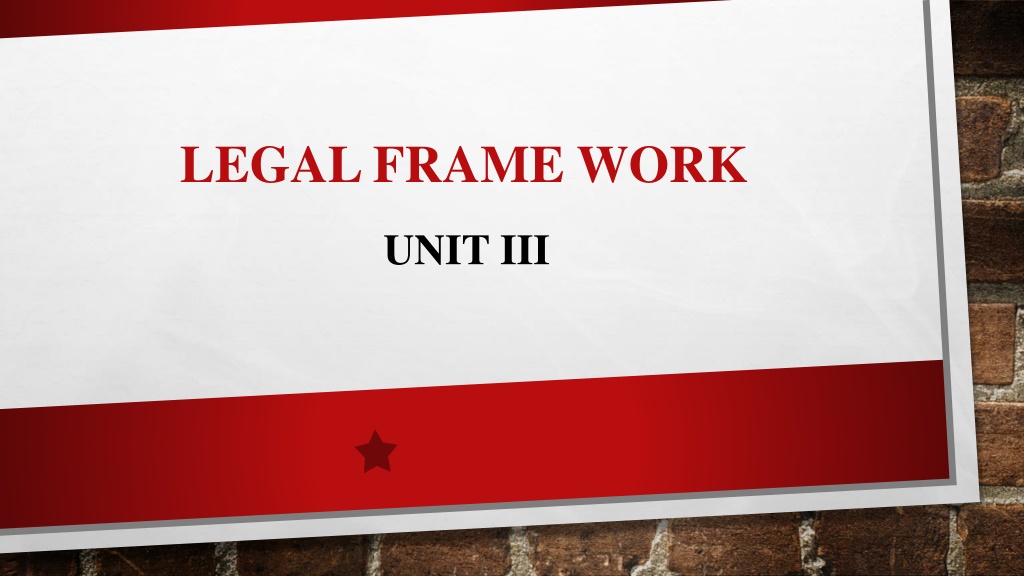Understanding the Role of Arbitrator in Legal Framework
An arbitrator, selected by mutual consent of parties, resolves disputes. They have powers to administer oaths, correct mistakes in awards, and more. The arbitrator's duties include following natural justice, acting fairly, deciding according to the law, and not exceeding authority.
Download Presentation

Please find below an Image/Link to download the presentation.
The content on the website is provided AS IS for your information and personal use only. It may not be sold, licensed, or shared on other websites without obtaining consent from the author. Download presentation by click this link. If you encounter any issues during the download, it is possible that the publisher has removed the file from their server.
E N D
Presentation Transcript
LEGAL FRAME WORK UNIT III
ARBITRATOR: HIS APPOINTMENT, POWERS AND DUTIES AN ARBITRATOR IS PERSON SELECTED BY MUTUAL CONSENT OF THE PARTIES TO SETTLE THE MATTERS IN CONTROVERSY BETWEEN THEM. A PERSON APPOINTED TO ADJUDICATE THE DIFFERENCE IS CALLED AN ARBITRATOR. ANARBITRATOR ISATRIBUNAL CHOSEN BY THE CONSENT OF THE PARTIES. ANY PERSON WHO ENJOYS THE CONFIDENCE OF THE PARTIES MAY BE SELECTED AS AN ARBITRATOR. EVERY PERSON IS FREE TO CHOOSE HIS OWN JUDGE FOR THE SETTLEMENT OF ANY MATTER IN CONTROVERSY, AND THE JUDGE SO CHOSEN, IF ACCEPTED BY THE OPPOSITE PARTY, BECOMES AN ARBITRATOR. THEY MAY CHOOSE AN ARBITRATOR BY LOT OR INANY OTHER WAY. IF THEYAN INCOMPETENT OR UNFIT PERSON, THAT IS THEIR OWN AFFAIR. 1)ANARBITRATOR MAY BE NAMED IN THEARBITRATION AGREEMENT, OR 2) HE MAY NOT BE NAMED ATALL, OR 3) IT MAY BE AGREED THAT THE ARBITRATOR SHALL BE APPOINTED BY A THIRD PARTY WHO SHALL BE NAMED IN THEAGREEMENT.
POWERS OF ARBITRATOR Section 13 lays down the powers of arbitrators or umpire. It is subject to the agreement of the parties. But they cannot be compelled to exercise those powers. This section is applicable to statutory arbitration as well. 1. To administer oath to parties and witnesses appearing before him; 2. To state a special case for the opinion of the court on any question of law or state the award in the form of a special case for the opinion of the court; 3. To make the award conditional or in the alternative 4. To correct in an award any clerical mistake or error arising from any accidental slip or omission 5. To administer any party interrogatories.
DUTIES OF ARBITRATOR 1. Duty to follow rules of natural justice 2. Duty to act fairly to both parties 3. Duty not to delegate 4. Duty to decide according to law 5. Duty not to exceed his authority 6. Duty to decide all matters referred 7. Duty to act together 8. Duty not to accept hospitality





















